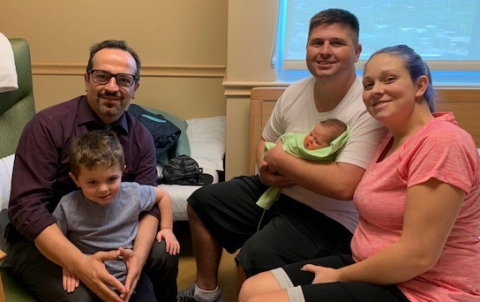Family Centered NAS Care Program

What is neonatal abstinence syndrome?
Neonatal abstinence syndrome occurs when infants are exposed to certain medications and/or drugs before they are born. After birth, the infant may go through withdrawal when they are no longer exposed to the medication or drug. When the infant shows signs of withdrawal we call this neonatal abstinence syndrome or NAS.
What causes neonatal abstinence syndrome?
Almost every drug and medicine pass from the mother’s bloodstream through the placenta to her unborn infant. Some prescription medications and illicit drugs can cause the unborn infant to become dependent. At birth, the infant continues to need the drug. But because the drug is no longer available, the infant goes through withdrawal. Some drugs and medicines are more likely to cause NAS than others. Opiates are a class of drugs that commonly cause NAS. Some examples of opiates include heroin, methadone, suboxone, Subutex, Vicodin, Percocet, oxycodone, Oxycontin and codeine.
Who is at risk for neonatal abstinence syndrome?
Pregnant women who use opiates may have infants who develop neonatal abstinence syndrome. Women who have a substance use disorder may also be less likely to get prenatal care. This can increase the chance of complications for both mother and infant.
About us
Our program is run by a neonatal team of specialists that includes doctors and nurse practitioners, nurses, therapists, social workers, and volunteer “cuddlers”, all to back you up while you take care of your baby. Click here to meet our team.
What are the symptoms of neonatal abstinence syndrome?
Symptoms of withdrawal may start as soon as 24 to 48 hours after birth and usually peak by day 5. Or they may start as late as 5 to 10 days after birth. Below are the most common symptoms of the NAS. Symptoms may be slightly different for each infant. Symptoms of withdrawal in full-term infants may include:
• Trembling or extreme shakiness
• Too much crying or high-pitched crying
• Sleep problems
• Tight muscle tone
• Overactive reflexes
• Yawning, stuffy nose, and sneezing
• Poor feeding and sucking
• Vomiting or diarrhea
• Sweating
• Fever or unstable temperature
What is Family Centered NAS Care?
Traditionally NAS was treated by observing the infant for signs and symptoms of withdrawal and starting medication (such as Morphine every 3 hours) when the symptoms become moderate to severe. Infants would be weaned off the medication over 3 to 4 weeks and then sent home. Our new approach is called Family Centered NAS Care (FC-NAS), and focuses on the mother (or family) as the treatment for the infant. With this new method, infants are able to go home in approximately 5 to 10 days. FC-NAS uses MOM or “Moms Over Medicine” model. You are the treatment for your baby. The mother is mentored and taught techniques to care for her infant and how to best manage NAS symptoms. We will be looking at three measures to assess the degree of you baby’s signs of withdrawal: 1) can he/she eat, 2) sleep and 3) be consoled. The goal is for you, the mother (or family) to stay at the bedside the entire time to take care you baby; he or she will do best with you. Members of our team will be there to back you up if you need to leave for an appointment or other commitment. A room with bed and bathroom will be available to you.
• Mother is the treatment
• Staff and family partner to provide the best possible care for the infant
• Mother (or designated family member) stays with the infant the entire hospitalization
• Your baby may require an occasional dose of medicine to help them during difficult times
• Collaboration with community partners such as behavioral health, medication assisted treatment centers, and Department of Child Safety is necessary to ensure a safe plan of care for the infant
• Call to schedule an appointment with Banner University Medical Center Tucson OB/GYN clinic at 520.694.8888
• Optional - Referral can be made by your physician to Banner University Medical Center Tucson’s OB/GYN department
• Meet with OB/GYN Social Worker (at 1st or 2nd clinic appointment), 520.694.4525
• Meet with Family Centered NAS Care Program Director(s), 520.694.9904
• At the time of delivery, inform Labor & Delivery Staff that you are participating in the Family Centered NAS Care Program

